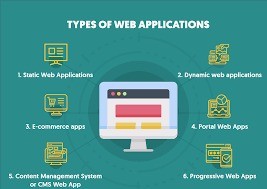Types of Web Apps You Can Develop – An Interesting Guide For Entrepreneurs

People are now more dependent on web apps, and it has become an essential part of our daily lives, empowering everything from social networks to online stores.
But not all the web apps are created with interesting features and functionalities. In this blog, we are going to explore the different types of web apps that a web application development company builds, and their unique features.
Are you excited to explore these apps with us?
Let’s get started…
Exploring Different Types Of Web Apps In 2024
In this section, we are going to explore the different types of web apps. Let’s explore it together.
1. Static Web Apps
The first type of web app that we are going to explore is a static web app that delivers content in a static manner, without any interaction or dynamic features.
Hence, these types of web apps are one of the simplest forms of web apps, and are often used for websites that don’t even require frequent updates from the client side.
Interesting Characteristics of Static Web App:
- Fixed content and structure.
- Easy to develop and deploy in the real time environment.
- Quick loading time.
- Limited interactivity between the users and web apps.
Use Cases of Static Web App:
- Blogs with FAQs and images.
- Personal Portfolios.
- Informational websites.
2. Dynamic Web Applications
The second type of web app that we are going to explore is known as Dynamic web app that comprises interactivity between the users. It relies on the server-side processing for displaying the updated and personalized data to the clients.
Interesting Characteristics of Dynamic Web App:
- Interactive and user friendly experience.
- Dynamic web apps require server-side scripting.
- Dynamic web apps can handle complex functionalities like user accounts and databases.
- Slower load time as compared to static web apps due to interactivity.
Use Cases of Dynamic Web App:
- Social media platforms.
- Online stores like Ecommerce web apps.
- Websites with frequent content updates.
These are a few of the interesting use cases regarding dynamic web apps that a flutter app development company should prioritize while deploying it in the real time.
3. Single Page Web Applications
The third type of web app that we are going to explore is, Single Page web app that loads a single HTML page at a time, and dynamically updates the content as per the user interaction.
This is one of the most used web app approaches with a seamless and fast user experience.
Interesting Characteristics of Single Page Web App:
- Comes with no page reloads, content updates can be done dynamically.
- Highly responsive and meets the requirements of the customers instantly.
- Uses JavaScript as the core framework like Angular, React and Vue.JS.
- It often uses RESTful APIs for the data fetching.
Use Cases of Static Web Apps:
- Client emailing like Gmail.
- Social Media Platforms like Facebook, Instagram etc.
- Project management tools.
4. Multi Page Web Applications
The fourth type of web app that we are going to explore is, Multi page web application that comprises multiple pages, and each reload takes time as it takes the users to a different section.
These are possibly suitable for application with extensive content and a complex architecture.
Interesting Characteristics of Multi Page Web App:
- Separate pages with different functionalities.
- Slower navigation due to page reloads.
- It’s easy to scale and maintain.
- It often uses traditional server-side rendering for a better customer experience.
Use Cases of Multi Web Page App:
- Ecommerce websites are a clear example of multi page web apps.
- Corporate websites with multiple sections available.
- Content heavy websites like news portals and a lot more.
5. Progressive Web Applications (PWAs)
The fifth type of web app that we are going to explore is known as, Progressive Web Application that uses modernized web capabilities for delivering an app-like experience to the customers.
Moreover, these can work offline as well, so you don’t need a working Internet connection. It can be installed easily on the user’s devices, and people enjoy using PWAs due to quick loading.
Interesting Characteristics of Progressive Web App:
- Reliable in terms of performance, and can even work on slow network connections.
- Offline functionalities are available that use service workers.
- Can be added easily to the home screen of the mobile phones.
- Enhances the security measures with HTTPs.
Use Cases of Progressive Web App:
- News reporting websites are a clear and crisp example of PWAs.
- Ecommerce platforms also come beneath it.
- Service-based web apps like Food Delivery or Travel Booking Web Applications.
6. Ecommerce Web Applications
On the sixth, we have Ecommerce web applications that are again hands down one of the finest inventions of web applications.
These web applications are designed specifically for the sales, and purchase of the products and services online without any issues. Moreover, it includes different features like product listings, shopping carts, and payment gateways option.
Interesting Characteristics of Progressive Web App:
- Product Catalog Management.
- A secured way for payment processing.
- User account management.
- Order tracking for the parcels and history check.
Use Cases of Progressive Web App:
- Online retail stores.
- Marketplace platforms.
- Subscription-based services.
7. Content Management System (CMS)
On the seventh, we have Content Management System (CMS) web applications that allow the users to create, manage and modify the digital content without even being specialized in technical aspects.
These are simple drag and drop, and require a website for regular updates and fixtures.
Interesting Characteristics of Content Management System (CMS):
- A user-friendly content editing tool.
- It’s a role based accessibility control.
- SEO friendly plugins integration.
- Extensible with plugins and themes.
Use Cases of Progressive Web App:
- Corporate websites.
- Blogs and news sites.
- Educational portals.
All the mobile app development companies offer mobile app development services that comprises web app design and development.
Wrapping Up
We are done for the day. We hope you all enjoyed reading about the different findings related to Web Applications. These were some of the possible outcomes along with use cases, however, if you wish to learn more then, you can do your research.
You will learn about different web apps within the range, and get the best outcome for yourself. Sounds good?



